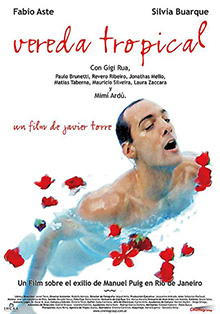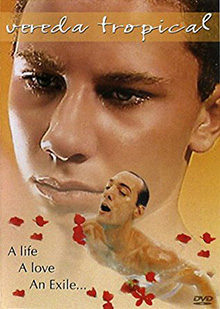 Vereda Tropical
Vereda Tropical
Written and Directed by Javier Torre
Premiered October 2, 2004, at the Rio de Janeiro International Film Festival
Drama (foreign: Argentina)
105 min.
Review by Stephen O. Murray
October 7, 2013.
The 2004 Argentine movie Vereda Tropical [Tropical Path], directed by Javier Torres in an unpredictable (and difficult to hear) mix of Spanish and Portuguese, shows Argentine-born writer Manuel Puig living in Rio de Janeiro, Brazil, during the 1980s.
A title at the start marks the year as 1980, and one at the end reports that Puig died in Cuernavaca, Mexico, in 1992 at the age of 57. That is, indeed, where he died, but he actually had died there two years earlier. If so basic and easily checked a detail is wrong, there is little to give confidence that the rest of the movie is factual.
Fabio Aster, who plays Puig, has some facial resemblance to Puig, though I think Aster is hunkier (with especially strong legs). Though the movie Puig is fey, I also think the original Puig was even more flamboyant a queen. He is pampered by the rich and glamorous May [Gigi Rua], visited by Argentine movie star Kari Kerr [Mimi Ardu], and treated with great gentleness by literary scholar Teresa [Silvia Buarque].
At the start, he is pursuing a man who broke with him when he discovered that Puig was covertly recording their interactions (research, according to Puig). Puig breaks with Dudi (Revero Riveiro), his bearded lover who is married to a woman and has children, claiming to have found a new love. Dudi only asks that no one ever learn that he is the man the recordings of their interactions the author made.
 In his way, Dudi does love Manuel. Manuel’s new “lover,” Roy [Jonathas Mello whose image dominates the cover of the American DVD shown here], politely spurns a tentative advance (touching his face) and urges Manuel, who has hired him to paint two tables red, to find someone who feels for Manuel as Manuel feels for him.
In his way, Dudi does love Manuel. Manuel’s new “lover,” Roy [Jonathas Mello whose image dominates the cover of the American DVD shown here], politely spurns a tentative advance (touching his face) and urges Manuel, who has hired him to paint two tables red, to find someone who feels for Manuel as Manuel feels for him.
Manuel’s upscale apartment has two posters of Rita Hayworth (and one of Che Guevara), and he seems to watch Gilda and A Streetcar Named Desire often. There are some books in the apartment but no indication he ever reads, and nothing about what he is writing on his typewriter. Someone unfamiliar with Puig’s novels would have no idea what his work dealt with or was like from watching this film. There is a text read aloud in the movie, but this is an 1892 letter from Rimbaud’s sister Isabelle (a test for Teresa).
The movie portrays Manuel Puig as somewhat of a sexual predator, seeking younger males to penetrate him. He is fag bashed when he cruises a man who takes umbrage, though earlier a young hunk cruises him and takes him off to have sex. The covert recordings mentioned seem predatory to me, though I wonder if they are an invention of the screenplay.
The relief at testing negative for HIV (though it seems to take place in 1980, before any cases of what became known as AIDS were noticed) is biographically accurate. Puig died of a heart attack, following gall bladder surgery.
Like Reinaldo Arenas, whose memoir Before Night Falls was made into a much better movie (with Javier Bardem playing Arenas), Puig hated the dictators ruling his native country and was restive in exile.
Both Arenas and Puig wanted to be taken (and loved?) by machos (who preferred women as sexual partners). Arenas had difficulty finding such partners in New York City, whereas Puig should not have had difficulty finding them in Rio. That these machos would want money in exchange for use of their phalluses was not a problem, and Dudi (as portrayed in the movie) comes as close to a predominantly straight partner who loves as well as penetrates a queen as the real world is likely to offer.
The author of Betrayed by Rita Hayworth (his best book IMO, first published in 1968) and Kiss of the Spider Woman (1991, his most famous because of the movie with William Hurt’s unjustly Oscar-winning performance as the jailed drag queen Molina) seems to have sought romance that only exists in movies.
Writers are self-centered and prone to using others, and showing how literary voices emerge is not easy. Thus, movies about writers generally are not about their writing, even if the authors are shown writing (or throwing her typewriter out the window as Jane Fonda, playing Lillian Hellman, did in Julia).
Still, an unhappily aging queen with some fag-hag friends and frustrations about young men not wanting him—rather than the joyous and very funny writer Puig was known to be—is all this movie presents.
I would therefore recommend Howl and Before Night Falls instead of Vereda Tropical. As much as I dislike William Hurt’s performance in Kiss of the Spider Woman, it is offset by Raúl Julia’s political prisoner and the stories (movies) Molina tells him, so I’d have to recommend it over Vereda Tropical.
First published by epinions, 7 October 2013
©2013, 2017, Stephen O. Murray

